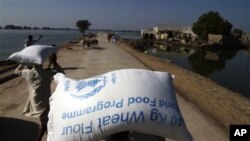UN aid agencies warn that funding shortfalls are threatening emergency aid operations for millions of flood victims in Pakistan.
Unprecedented monsoon rains in Pakistan in July and August triggered the country's worst natural disaster. Some 18 million people are affected by the catastrophic flooding.
Many people have been able to return to their homes and resume their lives. But the United Nations says 100 days into Pakistan's flooding crisis, an estimated 14 million people remain in need of urgent humanitarian assistance.
UN aid agencies say they are worried they will not be able to meet these needs because of a serious shortage of money. For instance, the United Nations Children's Fund, UNICEF, says it only has received 53 percent of its $251 million appeal.
UNICEF spokeswoman Marixie Mercado says the agency will be forced to cut back vital aid programs in the New Year if it does not receive the money it needs.
"One-point-four million people, around half of whom are children will stop receiving clean water," said Mercado. "One million people that UNICEF now provides with sanitation services will no longer receive them. Our nutrition program will have to scale back by half the number of severely malnourished children it is intended to reach. Our measles vaccination campaign targeting 26 million children will leave 11 million children un-immunized."
Mercado says chronic malnutrition is a long-standing problem in Pakistan. In Sindh province, she notes acute malnutrition rates were very high before the floods and are likely to be worse now.
She says the female health workers program is another likely casualty of the funding shortage. She says UNICEF will have to stop supporting tens of thousands of female health workers who provide critical services to households across the country.
"This is an extensive network of community-based women who provide, who really are the arms and legs of a health system," she added. "They are the ones that teach mothers how to do proper breast-feeding. They are the ones that immunize children. They are the ones that teach hand washing with soap. These are the people that provide really the nuts and bolts of child safety, of protecting children."
UNICEF worries about the approaching winter season. It says winters are particularly harsh in the north of the country, where people will be exposed to acute respiratory infections. And it says people in the south face severe malnutrition, polio, diphtheria, malaria and dengue fever.
UNICEF says it is pre-positioning winter supplies in northern districts, some of which will be cut-off by winter snow. The agency says it also is providing hundreds of thousands of people in southern regions with bed nets aimed at protecting them from malaria.
Funding Shortfalls Jeopardize Life-Saving UN Operations in Pakistan
- By Lisa Schlein










